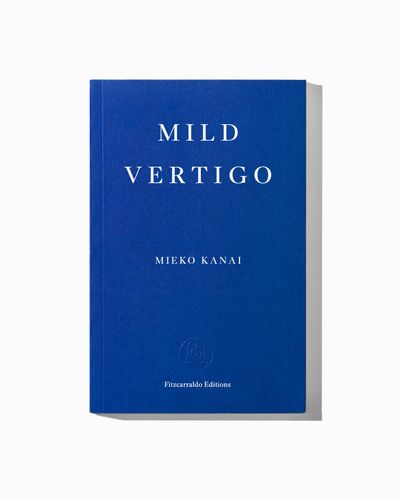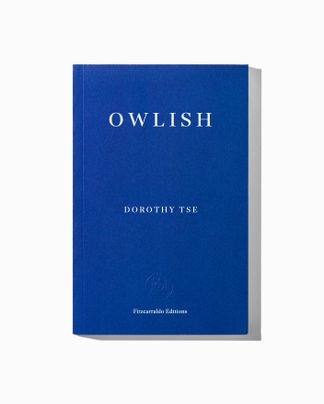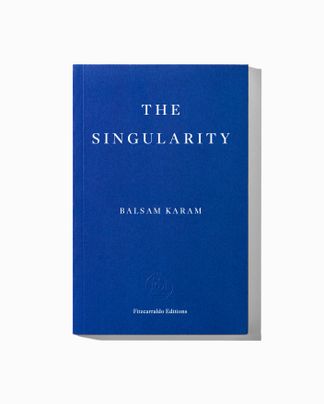Housewife Natsumi leads a small, unremarkable life in a modern Tokyo apartment with her husband and two sons: she does the laundry, goes on trips to the supermarket, visits friends and gossips with neighbours. Tracing her conversations and interactions with her family and friends as they blend seamlessly into her own infernally buzzing internal monologue, Mild Vertigo explores the dizzying reality of being unable to locate oneself in the endless stream of minutiae that forms a lonely life confined to a middle-class home, where both everything and nothing happens. With shades of Clarice Lispector, Elena Ferrante and Lucy Ellmann, this verbally acrobatic novel by the esteemed novelist, essayist and critic Mieko Kanai – whose work enjoys a cult status in Japan – is a disconcerting and radically imaginative portrait of selfhood in late-stage capitalist society.

Mild Vertigo
Translated by Polly Barton
French paperback with flaps, 176 pages
Published 21 June 2023
Mild Vertigo
Translated by Polly Barton
I. TAP WATER
The reason they’d settled on that apartment with its large, open-plan kitchen and windows with sizeable balconies to both the south and east sides wasn’t any particular passion for cooking on Natsumi’s part, let alone any special pride she took in her culinary abilities, but because it looked like the interiors she often saw and admired in the glossy pages of women’s magazines, and it had a kitchen island with a breakfast bar, as was now all the rage, or in vogue, or whatever you wanted to call it, which seemed like a pretty convenient feature, and above anything else, the front door of the two-bedroom apartment they’d been living in until that point, which hadn’t been a new build or anything, opened directly into the kitchen, so when you walked in you were immediately confronted by the sight of the sink and the gas hob and the fridge, and her mother, who’d never lived in either public housing or any other kind of apartment complex, would always comment that you shouldn’t open up the front door of the apartment and be right inside the kitchen, it makes the whole place feel impoverished, and honestly, if you don’t keep the sink spick and span then it’ll look even more impoverished, this became a catchphrase of hers every time she came over, and then she’d go on to say, I don’t care how cheap the mortgage payments are here, I just think an apartment with a separate kitchen would make things much easier, because as a housewife, you’re in there every day, she’d point out, darting glances at the sink and the hob, which of course weren’t kept in as pristine a state as Natsumi would ideally have liked, whereas in this new apartment with its breakfast bar, the front door didn’t open directly onto the kitchen, there was instead a proper entranceway, even if it was slightly cramped, which led to a hall, and a door with glass panels framed in white wood separating the hall from the main living space, which meant you could avoid having visitors unexpectedly catching a glimpse of your chaotically messy kitchen in its entirety, which she preferred, and in terms of the size of the apartment – the open-plan room was about twelve tatami mats large, and then there was a six-mat room with tatami flooring, a three-mat utility room off the kitchen, and two rooms, eight mats and seven mats in size, with Western-style flooring – she couldn’t help but feel it was somewhat luxuriously spacious for a family like hers, composed of herself and her husband and two children of kindergarten and primary-school age, and the kids were very excited about the children’s pool in the courtyard of the new apartment block, and even though it was really only big enough to splash around in and not to actually swim laps, they declared it soooo cool, we’ll be like rich people, they said, and although it was blindingly obvious to Natsumi that they’d get sick of the pool in no time and it would become an object of ridicule, for the moment they were over the moon, and though the eight-mat room was currently being used by her husband as his ‘study’, she figured that when the kids moved up to middle school they’d probably grow dissatisfied with the current arrangement, which had them sleeping in bunk beds in the seven-mat room, and they’d want their ‘own rooms’, and if that happened, then they could free up the ‘study’ and move one of the kids in there, and her husband could use the utility room – which currently accommodated a washing machine, tumble dryer, and laundry basket, and then, on the opposite wall, a lightweight wall-storage unit they’d ordered online made of white-polyester-resin-coated plywood, which fit the dimensions of the room as snugly as if it’d been made to measure – as his ‘study’ instead, at least that was what they’d discussed, but if that situation actually materialized, she had no idea where on earth they’d put the washing machine, or the tumble dryer, or the storage unit – which was used for the vacuum and the washing and cleaning products, as well as canned goods and other food supplies she’d bought in reserve, and various odds and ends in assorted shapes and sizes – and, to add to their problems, the ‘study’ currently contained five bookshelves made of steel and plywood, a desk, a computer and a video camera, which her husband had been using as part of a project to ‘create a record of the family’ – a project that, whether because he’d gotten fed up with filming or because he’d never really had much in the way of a visual sensibility to begin with, he had subsequently abandoned, having shot not even ten hours of footage in total, a good portion of which had its subjects’ heads lopped from the frame – as well as a chest expander he’d used back in his student days, and something called a SUPER GYM DX (made in Taiwan), which promised ‘Real Results from Everyday Training’, offering ‘Training as Good as You’d Get in Any Gym, Thanks to a Hydraulic Cylinder, for Convenient Home Workouts Whenever Suits You! Cure a Lack of Exercise, Tone and Shape Up and Improve Strength’, and which he’d bought without consulting her, and though it hadn’t been all that expensive, it weighed sixty-six pounds and two ounces and was three feet and nine inches wide, five feet and three inches deep and four feet and ten inches tall, and when she thought about all these things she felt like taking them out with the rubbish tomorrow and being done with it, but in any case, it wouldn’t be for another five or six years that they’d have to consider making these new arrangements, and now as she was trying to figure things out, to make calculations involving the layout of the apartment and the furniture, which should in theory have been simple, there was always some kind of slip-up involved (when she finally thought she’d solved the issue so that everything would fit, it would turn out that the door in fact opened into the room, even though logically it should have opened out, and so on), and, deciding that worrying too much about these kinds of things was ultimately detrimental, she resolved to stop obsessing over them. I guess we can figure it out in due course, right, she said to her husband, and he replied from where he was lying sprawled out on the sofa, his head propped up on a pile of cushions, not removing his gaze from the TV screen, right, right, all in due course, which irritated he slightly, but it wasn’t like the issue was presenting a problem for her now in the present moment, in fact it really was true that they could just figure it out in due course, so she refrained from saying what she was tempted to say, which was, but that’s what you always say.
(…)
‘I began to wonder whether I had always thought this way, whether this book was making me aware of the true nature of my mind for the first time. Such is the mesmerizing wonder of Kanai’s prose, as translated by Polly Barton.’
— Claire Oshetsky, New York Times
‘In the vertigo lurking at the depths of a very ordinary life, Mieko Kanai succeeds in uncovering the tranquillity and cruelty that exist side by side.’
—Yoko Ogawa, author of The Memory Police
‘Mild Vertigo is an immersive, uncanny narrative held taut over eight chapters that contrasts existing and living, seeing and viewing. An enthralling horror story about tedium that pushes the reader tight up against the unmanageable moments of everyday life and the domestic.’
— David Hayden, author of Darker With the Lights On
‘A unique form of realism cultured from rhythmic, alert sentences that left my sense of the everyday altered, and made me desperate to read everything else Kanai has written.’
— Holly Pester, author of Comic Timing
‘A dizzying, kaleidoscopic novel. Bold yet simple, quiet yet choric, Mild Vertigo brilliantly captures the noisiness of a lonely life.’
— Aidan Cottrell-Boyce, author of The End of Nightwork
‘Mild Vertigo deftly captures the monotony of housework and the loss of self in family life, exploring a generalized sense of dissatisfaction with the options available to women in contemporary capitalism. Kanai’s beautiful and strange prose takes the reader inside the mind of a woman whose world is both mundane and disintegrating.’
— Alva Gotby, author of They Call It Love
‘Mieko Kanai is not interested in describing objects; she wants to accentuate their amorphous nature.’
— Sofia Samatar, The Paris Review
‘Laden with descriptions of objects and locations, Kanai’s detail-rich sentences offer a specificity of time and place. A subtle, thoughtful portrait of a woman chafing at the demands and constraints of domestic life.’
— Kirkus, starred review
‘For me, Mieko Kanai’s writing represents one of the high points of Japanese literature. The tiny details give shape to the everyday, the daily repetitions, the memories that come suddenly flooding back, other people’s voices – all of these described in winding, iridescent prose. Their utter ordariness, their utter irreplaceability, make for a reading experience brimming with joy from start to finish.’
— Hiroko Oyamada, author of Weasels in the Attic
‘A sharp and sleek read that questions what is automated and what it means to be knowing, in a life compartmentalized into ribbons.’
— Tice Cin, author of Keeping the House
‘[Mieko Kanai is] not interested in describing objects; she wants to accentuate their amorphous nature…. Sections of the novel first appeared as monthly installments in a glossy magazine about bourgeois homemaking; also included are two reviews of photography exhibitions. Kanai says that these previously published articles and reviews, which appeared in different journals, were written in order to be collected as a novel. Written in order to be collected. The exhibition reviews, the advice flipped through in a women’s magazine: always a novel.’
— Sofia Samatar, author of Tender
‘Polly Barton’s deft translation of Mild Vertigo … plunges us into the mental life of Natsumi…. One of the novel’s great comic performances is Natsumi’s intense visualization of the contents of a supermarket she will visit later that day, comprising various lists extended to maddening lengths. But the near-identical repetition of this recital at the close of the novel, replete with the same details and wry observations, is much darker in tone. What was first presented as farce returns as tragedy – of a profoundly impoverished emotional life.’
— Doug Battersby, Times Literary Supplement
‘Mieko Kanai’s writing – encompassing fiction, poetry and criticism – has been sorely overlooked in the English-speaking world, so the new translation of her 1997 novel Mild Vertigo is a welcome arrival. The book is a surrealistic portrayal of quotidian middle-class life in late-20th century Japan.’
— Marko Gluhaich, Frieze
‘From the first sentence of Mieko Kanai’s Mild Vertigo you’re already in a whirling state of imbalance, thanks to Kanai’s distinctive style and Polly Barton’s mesmerizing translation. The first sentence stretches out across pages – four to be exact – and you’re pulled into the mind of Natsumi, a Tokyo housewife and mother who never feels inclined to name her two young children. It’s a spiraling read of the everyday in all its idiosyncratic, tragicomic edges…. Humorous and thought-provoking, literary yet somehow escapist, Mild Vertigo is worth the challenge.’
— Kris Kosaka, Japan Times
‘Kanai’s prose has a hypnotic rhythm that takes hold from the start and grips you. You’re there inside her head; she’s inside yours. The final pages build like a sound wall, a cacophony, punctuation rejected, gaining momentum, recalling the final pages of Ulysses – though here the mood, rather than affirmative, is future uncertain.’
— Lee Langley, Spectator Australia
‘This is not a narrative of passive surrender, but a chronicling of a routine lived beat-by-beat among life’s daily provocations.… Between narrator and reader there is a conspiratorial candour and deadpan humour, which is captured deftly in Polly Barton’s translation.’
— Rónán Hession, Irish Times
‘Kanai’s gift is attention: attention to familial memory, to overheard conversation, to those small glints (sometimes a dagger, sometimes a gift) that can appear in conversations among friends.’
— Australian Broadcasting Corporation
‘[It’s] the observations of subtle minutiae that make Mild Vertigo an effortlessly intriguing read. Between a stream-of-consciousness-inspired prose, image patterns, and consistent pivots of thought, Kanai establishes the most surprising thing about this novel: its ability to make the vertiginous hypnotic.’
— Gracie Jordan, The Rumpus
Born in 1947, Mieko Kanai has worked throughout her life as a writer, poet, essayist and literary and art critic. She has published around thirty novels and short story collections, and her critical essays have been featured in Japanese newspapers and magazines for almost fifty years.
Polly Barton is a writer and Japanese translator. Her translations include Where the Wild Ladies Are by Aoko Matsuda, So We Look to the Sky by Misumi Kubo and There’s No Such Thing as an Easy Job by Kikuko Tsumura. She is the author of Fifty Sounds and Porn: An Oral History, both published by Fitzcarraldo Editions.




